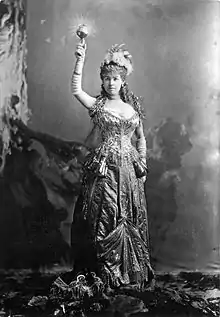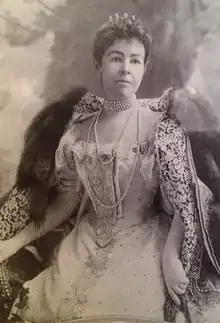Alice Claypoole Vanderbilt
Alice Claypoole Vanderbilt (née Gwynne; November 11, 1845 – April 24, 1934) was the wife of Cornelius Vanderbilt II and reigned as the matriarch of the Vanderbilt family for over 60 years.[1]
Alice Claypoole Vanderbilt | |
|---|---|
 In costume as "The Electric Light" at a ball on March 26, 1883 | |
| Born | Alice Claypoole Gwynne November 11, 1845 Cincinnati, Ohio, U.S. |
| Died | April 24, 1934 (aged 88) Manhattan, New York City, U.S. |
| Spouse | |
| Children | Alice Gwynne Vanderbilt William Henry Vanderbilt II Cornelius Vanderbilt III Gertrude Vanderbilt Alfred Gwynne Vanderbilt Reginald Claypoole Vanderbilt Gladys Moore Vanderbilt |
| Parent(s) | Abraham Evan Gwynne Rachel Moore Flagg |
Early life and relatives
Alice Claypoole Gwynne was born on November 11, 1845, in Cincinnati, Ohio. Alice, who was also raised in Cincinnati, was a daughter of lawyer Abraham Evan Gwynne and his wife, Rachel Moore Flagg. After her father's death in 1855, her mother remarried to Albert Mathews, who wrote under the name Paul Siogvolk.[1] Alice's siblings included David Eli Gwynne, Abram Evan Gwynne, Cettie Moore (née Gwynne) Shepherd, and Edith Olivia (née Gwynne) Gill.[2]
She was a granddaughter of Henry Collins Flagg, a former mayor of New Haven, Connecticut, and a great-great-granddaughter of Major Ebenezer Flagg, who served in the 1st Rhode Island Regiment during the American Revolution and was killed in action in 1781. Her maternal uncles were George Whiting Flagg, a painter,[3] and Jared Bradley Flagg, a real estate developer and also a painter.[4] Through Jared Flagg, she was a first cousin of architect Ernest Flagg.
Alice was from an old Rhode Island family and among her ancestors was Roger Williams, who founded the State of Rhode Island, and Samuel Ward Sr., a former Rhode Island Governor. Many Flagg family members are buried in Newport's Island Cemetery.[5] Alice's affection for Newport reflected this association of her earliest colonial ancestors with the city.[5]
Marriage and children


While teaching Sunday school at St. Bartholomew's Episcopal Church in New York City, she met Cornelius Vanderbilt II, the eldest son of William Henry Vanderbilt and Maria Louisa Kissam. They were married on February 4, 1867, at the Church of the Incarnation on Madison Avenue in New York.
Together, they were the parents of four sons and three daughters:[1][5]
- Alice Gwynne Vanderbilt (1869–1874), who died young.[5]
- William Henry "Bill" Vanderbilt II (1870–1892), who died of typhoid fever while a student at Yale University.[5]
- Cornelius "Neily" Vanderbilt III (1873–1942), who was disinherited for marrying Grace Graham Wilson against his parents' wishes.[6]
- Gertrude Vanderbilt (1875–1942), who married Harry Payne Whitney.[7] She was an artist who founded the Whitney Museum.[8]
- Alfred Gwynne Vanderbilt (1877–1915), a businessman who died aboard the RMS Lusitania.[9]
- Reginald Claypoole Vanderbilt (1880–1925), an avid equestrian.[10]
- Gladys Moore Vanderbilt (1886–1965), who married Count László Széchenyi.[11]
Later life
Alice Vanderbilt's husband died of a cerebral hemorrhage on September 12, 1899, in their New York home at 1 West 57th Street.[12] His estate at the time of his death was appraised at $72,999,867 (equivalent to $2.57 billion[13] in 2022 dollars[13]), $20 million of which was in real estate.[14]
Alice lived another 35 years until her death on April 22, 1934, in her home at 857 Fifth Avenue in Manhattan, where she had moved after the 1926 sale of the 57th Street mansion (which was then demolished).[1]
Her youngest child, Countess Széchenyi, inherited both the massive summer "cottage" (The Breakers in Newport) and the New York townhouse at 857 Fifth Avenue (the former residence of George Jay Gould). Gertrude received the proceeds from the sale of 1 West 57th Street, totaling $7,000,000.
Real estate

Alice was responsible for constructing several massive family houses, including the enlargement of 1 West 57th Street, making it the largest private residence ever built in an American city at the time. She also played a role in constructing The Breakers in Newport.
In 1914, she was responsible for the construction of the Gwynne Building in Cincinnati, Ohio, site of the first shop of Procter & Gamble and later the company's headquarters.[5] After her death, her son Neily received ownership of the Gwynne Building.[5]
Philanthropy
Alice donated to various charitable causes. Throughout her life, she was a large supporter of the YMCA, Salvation Army, Red Cross, Trinity Church and St. Bartholomew's Church. She and her husband donated Vanderbilt Hall to Yale College in memory of their eldest son, Bill, a student there when he died in 1892. She gave the front gates of her former mansion at 1 West 57th Street to be placed in Central Park. She also donated a facility to Newport Hospital in 1903 in memory of her late husband.[5]
Descendants
Through her son Alfred, Alice was the grandmother of William Henry Vanderbilt III, Alfred Gwynne Vanderbilt Jr., and George Washington Vanderbilt III.[15]
Through her youngest son Reginald, Alice was the grandmother of Cathleen Vanderbilt and Gloria Vanderbilt, the socialite and fashion designer, and the great-grandmother of news anchor Anderson Hays Cooper and his late brother, Carter Vanderbilt Cooper.[15]
References
- "Mrs. Vanderbilt Sr. Dies In Home At 89. Widow Of Financier, Long Ill. Was A Leader In Brilliant Era Of New York Society". The New York Times. April 23, 1934.
- Flagg, Ernest (1926). Genealogical Notes on the Founding of New England: My Ancestors Part in that Undertaking. Genealogical Publishing Com. pp. 7, 105, 118, 135, 136, 139, 144. ISBN 9780806305332. Retrieved 17 April 2018.
- "DEATH LIST OF A DAY; George W. Flagg". The New York Times. January 12, 1897. Retrieved 17 April 2018.
- "Jared B. Flagg". The Sun. New York City. September 26, 1899. p. 9. Retrieved May 3, 2018 – via Newspapers.com.
- Arthur T. Vanderbilt II (1989). Fortune's Children: The Fall of the House of Vanderbilt. New York: Morrow. ISBN 0-688-07279-8.
- "Gen. C. Vanderbilt Dies On His Yacht. Great-Grandson and Namesake of Commodore Succumbs in Miami to Brain Hemorrhage. Family With Him At End. He Won Distinction as Soldier, Inventor, Engineer, Yachtsman. Often Host to Royalty". The New York Times. Associated Press. March 2, 1942.
- Times Wide World (27 October 1930). "H.P. WHITNEY DIES AT 58 OF PNEUMONIA; ILL ONLY A FEW DAYS; Sportsman and Financier Succumbs Unexpectedly at His Fifth Avenue Home. CAUGHT COLD ON TUESDAY. His Wife, the Former Gertrude Vanderbilt, and Their Three Children at Bedside. HE INHERITED A FORTUNE Built Up Vast Properties and Became One of Nation's Richest Men -- Famed for Racing Stables. One of America's Richest Men. H.P. WHITNEY DIES AT 58 OF PNEUMONIA Heir to Wealth and Prestige. Guggenheim Guided His Start. Known Also as Dog Fancier. Many Concerns Now Merged". The New York Times. Retrieved 30 November 2016.
- "Mrs. H.P. Whitney, sculptor, Is Dead". The New York Times. April 18, 1942. Retrieved December 17, 2014.
-
 Homans, James E., ed. (1918). . The Cyclopædia of American Biography. New York: The Press Association Compilers, Inc.
Homans, James E., ed. (1918). . The Cyclopædia of American Biography. New York: The Press Association Compilers, Inc. - "Reginald Vanderbilt Dies Suddenly Today". The Meridien Daily Journal. 4 September 1925. Retrieved 15 March 2011.
- Times, Special To The New York (4 October 1907). "MISS VANDERBILT WILL WED A COUNT; Gladys, Youngest Daughter of Mrs. Cornelius Vanderbilt, the Financee of Laszlo Szechenyi. HUNGARIAN HERE FOR BRIDE Young Court Chamberlain Is a Guest at the Breakers, Newport -- Betrothal Made in Europe Last Summer". The New York Times. Retrieved 15 April 2017.
- "MR. CORNELIUS VANDERBILT DEAD; Succumbed Suddenly Yesterday to Cerebral Hemorrhage. DUE TO STROKE OF PARALYSIS Wife and Daughter Gladys Only Members of His Family With Him. He Had Come to This City on Monday from Newport to Attend a Railroad Meeting -- Funeral Services to be Held on Friday". The New York Times. 13 September 1899. Retrieved 15 April 2017.
- 1634–1699: McCusker, J. J. (1997). How Much Is That in Real Money? A Historical Price Index for Use as a Deflator of Money Values in the Economy of the United States: Addenda et Corrigenda (PDF). American Antiquarian Society. 1700–1799: McCusker, J. J. (1992). How Much Is That in Real Money? A Historical Price Index for Use as a Deflator of Money Values in the Economy of the United States (PDF). American Antiquarian Society. 1800–present: Federal Reserve Bank of Minneapolis. "Consumer Price Index (estimate) 1800–". Retrieved May 28, 2023.
- "C. Vanderbilt's Personal Estate" (PDF). The New York Times. December 12, 1900. Retrieved August 25, 2017.
- Vanderbilt, 173-185.